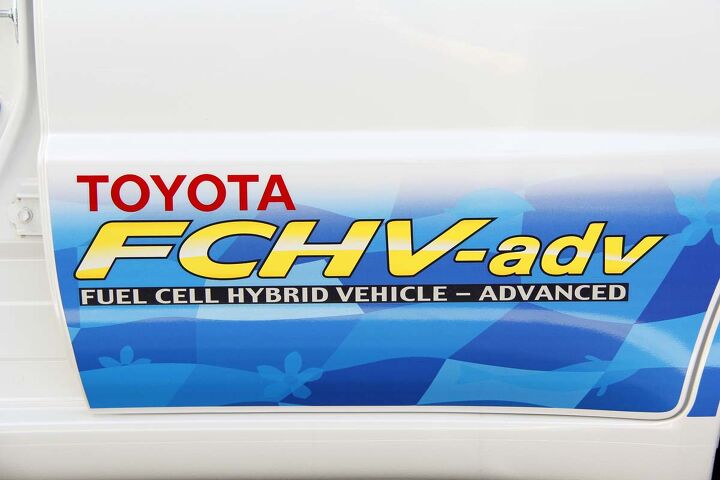The End Run Of The Fuel Cell Race

The excitement about battery electric vehicles seems to die down amidst disappointing uptake. Range, weight and cost are in the way. At the same time, dormant interest in fuel cell vehicles is being rekindled . A month ago, we had a new look at the technology from the perspective of the Toyota/BMW linkup. Today, The Nikkei [sub] takes a broader view and says that carmakers are in the final lap of the fuel cell race. Let’s have a look at the contestants and where they stand.
Says The Nikkei [sub]:
“While many car companies are already in a fierce battle for a slice of the market for environmentally friendly vehicles such as hybrids and electric cars, they are also in the final stages of developing fuel-cell cars, which are widely expected to be the ultimate eco-cars because they emit no greenhouse gases such as carbon dioxide, or other pollutants.
Leading the charge in fuel-cell development are Toyota Motor Corp. , Honda Motor Co., General Motors Co. of the U.S. and Germany’s Daimler AG. The stakes are high, given the vast sums already spent.”
Roland Berger Strategy Consultants told the Tokyo wire that “the four automakers have already spent a combined 100 billion yen on the technology.” That would be a little over a billion $, and I believe that number is low.
Fuel cell research had been conducted since the last millennium. The 2008 financial crisis slowed it down. Carmakers had to cut R&D even on regular cars. Recently, development revved up again.
Prototypes and test vehicles have been driving around for years without exploding. 2015 is the date several carmakers name for the first commercial launch of fuel cell vehicles. Satoshi Ogiso, Toyota’s man in charge of new technology, thinks that the only challenge is affordability. During an interview with TTAC last year, he likened the challenge to what had faced him during the launch of the first hybrids in 1995.
Just like hybrid powertrains in the 90s, current fuel cell powertrains are big, bulky, heavy and expensive. Ogiso and his colleagues at other carmakers are working on the problem.
The solution to many ills in the auto industry is scale: Make and sell enough cars with the new technology, and you can spread the price of development over many units. Also, with mass production, the price of components can come down drastically.
Even the largest automakers don’t want to wait until they achieved the necessary scale effects themselves. They forge alliances with other automakers.
- Toyota, usually a company that does it alone and in-house, famously entered an alliance with BMW.
- Nissan and Renault agreed with Daimler to expand the scope of their cooperation to fuel-cell cars.
- Honda appears to be partner-less.
- GM negotiated a fuel cell partnership with BMW. The Bavarians broke off the discussion and are winding down a new energy alliance with GM partner PSA after hooking up with Toyota.
Says The Nikkei:
“One GM executive who has worked on the automaker’s fuel-cell effort for a long time lamented being handed another setback by Toyota.”
Observers familiar with the matter expect more tie-ups. The Roland Berger consultancy predicts that Toyota will enlarge its circle of fuel cell partners.
It will be a few years until fuel cell cars can compete in the marketplace. In the meantime, there is a fierce and sometimes uncivil competition for government grants.
When the U.S. government did bet heavily on EVs in 2009 and decided to shift funding away from fuel cell vehicle research, Secretary of Energy Steven Chu said that fuel cell vehicles “will not be practical over the next 10 to 20 years.” In the meantime, he had a change of heart.
“The development of America’s tremendous shale gas resources is also helping to reduce the costs of producing hydrogen and operating hydrogen fuel cells,” Bill Gibbons, a spokesman for the department, told the New York Times in May.
If an investment into fuel cell vehicles would be successful at last, past investments into EVs would not go to waste. A fuel cell is just another battery. Except that it can be charged in minutes than hours, and except that it lasts 400 miles instead of 100.

Bertel Schmitt comes back to journalism after taking a 35 year break in advertising and marketing. He ran and owned advertising agencies in Duesseldorf, Germany, and New York City. Volkswagen A.G. was Bertel's most important corporate account. Schmitt's advertising and marketing career touched many corners of the industry with a special focus on automotive products and services. Since 2004, he lives in Japan and China with his wife <a href="http://www.tomokoandbertel.com"> Tomoko </a>. Bertel Schmitt is a founding board member of the <a href="http://www.offshoresuperseries.com"> Offshore Super Series </a>, an American offshore powerboat racing organization. He is co-owner of the racing team Typhoon.
More by Bertel Schmitt
Latest Car Reviews
Read moreLatest Product Reviews
Read moreRecent Comments
- Kjhkjlhkjhkljh kljhjkhjklhkjh A prelude is a bad idea. There is already Acura with all the weird sport trims. This will not make back it's R&D money.
- Analoggrotto I don't see a red car here, how blazing stupid are you people?
- Redapple2 Love the wheels
- Redapple2 Good luck to them. They used to make great cars. 510. 240Z, Sentra SE-R. Maxima. Frontier.
- Joe65688619 Under Ghosn they went through the same short-term bottom-line thinking that GM did in the 80s/90s, and they have not recovered say, to their heyday in the 50s and 60s in terms of market share and innovation. Poor design decisions (a CVT in their front-wheel drive "4-Door Sports Car", model overlap in a poorly performing segment (they never needed the Altima AND the Maxima...what they needed was one vehicle with different drivetrain, including hybrid, to compete with the Accord/Camry, and decontenting their vehicles: My 2012 QX56 (I know, not a Nissan, but the same holds for the Armada) had power rear windows in the cargo area that could vent, a glass hatch on the back door that could be opened separate from the whole liftgate (in such a tall vehicle, kinda essential if you have it in a garage and want to load the trunk without having to open the garage door to make room for the lift gate), a nice driver's side folding armrest, and a few other quality-of-life details absent from my 2018 QX80. In a competitive market this attention to detai is can be the differentiator that sell cars. Now they are caught in the middle of the market, competing more with Hyundai and Kia and selling discounted vehicles near the same price points, but losing money on them. They invested also invested a lot in niche platforms. The Leaf was one of the first full EVs, but never really evolved. They misjudged the market - luxury EVs are selling, small budget models not so much. Variable compression engines offering little in terms of real-world power or tech, let a lot of complexity that is leading to higher failure rates. Aside from the Z and GT-R (low volume models), not much forced induction (whether your a fan or not, look at what Honda did with the CR-V and Acura RDX - same chassis, slap a turbo on it, make it nicer inside, and now you can sell it as a semi-premium brand with higher markup). That said, I do believe they retain the technical and engineering capability to do far better. About time management realized they need to make smarter investments and understand their markets better.




































Comments
Join the conversation
"The excitement about battery electric vehicles seems to die down amidst disappointing uptake. Range, weight and cost are in the way." I think it's fairly safe to assume that for BEVs, these issues will be resolved to the public's satisfaction sooner than it can be said for the issues holding back hydrogen vehicles. Either way though, I don't understand why these two methods are always pitted against each other. Both use the electric motor as their source of motion. To fit a fuel cell into a BEV as a range extender could solve a lot of the issues that both technologies face alone.
Mars Rover is the future. Nuclear powered cars for all, just pay close attention to that temp gauge.